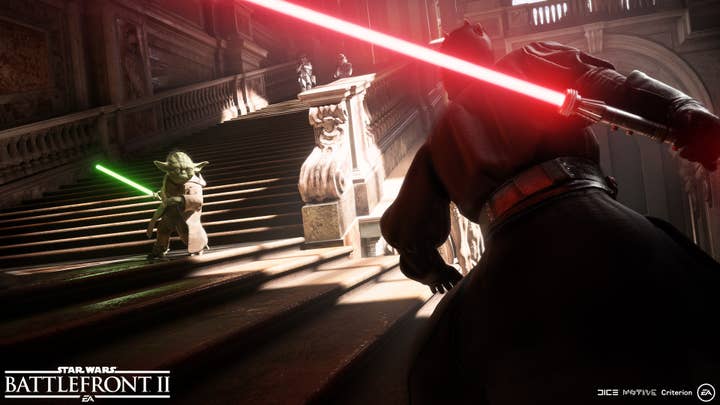Star Wars: Battlefront II debacle points the way forward
EA's approach to microtransactions has been a complete disaster, but it may have stumbled upon a model other publishers should consider emulating
The run-up to launch for Star Wars: Battlefront II has been, to put it bluntly, a fiasco. I would suggest that it has also provided a model for publishers to follow in the future.
When Electronic Arts announced at E3 that it was scrapping the Season Pass model for Battlefront II, the move was met warmly by players. After all, the Season Pass split the player base into people with the DLC and without, preventing them from enjoying new maps and game modes together. At the time, the understanding was that EA would introduce a system for unlocking content within the game, where progress could either be earned through gameplay or purchased through microtransactions. And for the most part, people were fine with that.

But as the company revealed exactly how the system would be implemented, details like how long it would take to unlock things without paying and what sort of advantages paying players could expect in multiplayer matches rankled players. EA's repeated insistence that it was taking the feedback seriously and changing the system in response did little to appease the angry fans. The uproar seemed to gain more traction as the game's release approached until, on the literal eve of launch day, EA announced that it was shutting off the game's microtransactions, reinstating them at a later date when the progression system had been properly fine-tuned.
By not having microtransactions turned on at launch, publishers know they have to provide an experience that is fun and engaging for non-payers
You could characterize it as a desperate move to salvage the launch of a massive publisher's holiday lynchpin release, or you could point to it as a new standard, a potential solution to a problem that has dogged the AAA industry since Oblivion's horse armor first debuted over a decade ago. Why don't more AAA games launch with a microtransaction-free grace period?
The benefits to the players are fairly clear. By not having microtransactions turned on at launch, publishers know they have to provide an experience that is fun and engaging for non-payers, and ensures that in-game systems won't be designed around an intolerable grind pushing people into spending more money. It dissuades developers from locking content that players would consider essential (like, say, playing as Luke Skywalker or Darth Vader in a Star Wars game) behind unreasonably high progression walls. In short, it "keeps them honest," while the early adopters who pay full price (or close to it) for a new release get to enjoy a premium, limited-time experience without the constant pressure to spend more money.
At the same time, it provides publishers with plenty of upside as well. For one, they get to monitor how paying customers are behaving in their game under real-world conditions for a length of time to help with balancing the microtransaction system. And assuming they design the game to be fun without the microtransactions, they'll almost certainly benefit from better word of mouth and review scores at launch.
Publishers who adopt a grace period before instituting microtransactions will be mitigating some of the harmful effects of the AAA marketing hype cycle
And most crucial of all, publishers who adopt a grace period before instituting microtransactions will be mitigating some of the harmful effects of the AAA marketing hype cycle. It's no coincidence that the backlash to Battlefront II's microtransactions has grown as the game has neared launch, even though EA has apologized and downgraded the aggressiveness of its approach multiple times in response.
The company's successful marketing campaign was designed to generate interest and excitement and passion in such a way that would crescendo at launch. And it did. But as we've seen too many times in recent years, "passion" in the player base is not an exclusively positive thing. Passion is a multiplier of other emotions. It makes those who love a game get tattoos, and those who hate it lob death threats online. Waiting until after the launch window to turn microtransactions on allows publishers to benefit from the passion they've spent so much time and money building, while putting off one obvious source of potential backlash until people have cooled down a bit and the monetization scheme of last holiday's big shooter release just doesn't seem like something worth grabbing a pitchfork over. This is especially true given how many members of the pitchfork mob will have purchased the game, played it, and traded it in or redirected their enthusiasm to the next big release in the meantime.
And what would it cost the publishers to do this? A couple months' worth of microtransaction revenues in games that are designed and intended to be live services. For a successful live service game, the first months of revenue are well worth sacrificing if it might buy you the traction you need for the long run. (Grand Theft Auto Online is four years old and just had its most lucrative quarter ever.)
Microtransactions are a powerful force for the games industry these days, opening up a slew of alternative business models and providing potential answers to many of the problems that have long dogged publishers. EA may have unwittingly showed us a way to finally bring balance to the Force.
